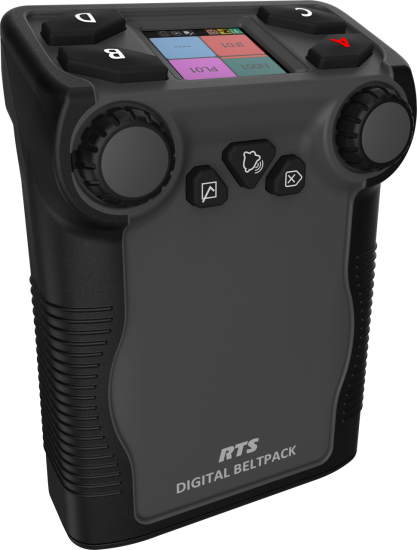RTS introduces DBP (Digital Beltpack)
New member of the RTS Digital Partyline intercom product family

RTS announces the global introduction of DBP (Digital Beltpack) – the latest addition to the brand’s portfolio of OMNEO* IP intercom solutions. DBP also joins the recently launched OMS (OMNEO Main Station) as a key member of a major new product family: RTS Digital Partyline.
DBP is a four-channel/four-button wired beltpack that runs on PoE+ (Power over Ethernet 802.3af and 802.3at) and connects using OMNEO IP technology. Its unique hybrid design supports both digital partyline and matrix keypanel modes: for use as a digital partyline device, DBP connects to an OMS; for use as a portable keypanel, including functionality like point-to-point communication, DBP can be connected to any RTS digital/IP matrix product using OMNEO – including OMI cards in ADAM/ADAM-M frames or OMNEO ports on ODIN frames. DBP automatically selects the correct mode of operation (digital partyline/OMS or keypanel/matrix) when connected and switched on.
DBP’s PoE-driven design gives it an unmatched level of scalability and makes it easy to add new users. In and Out PoE ports (two etherCON locking RJ45 connectors) allow up to six DBP devices to be daisy-chained together from the same PoE switch port when used in partyline mode. Up to 40 DBPs can be connected to an OMS, allowing for the creation of an extensive digital partyline system – all in addition to the other wired and wireless devices OMS supports. Depending on the matrix model/configuration, up to 64 DBPs can be connected to an OMI card for ADAM matrices, and up to 128 DBPs can be connected to one ODIN.
“DBP is one device that can cover it all, whether the application is simple or sophisticated,” says Angelo Piga, RTS Product Manager. “It’s ideal for new users or current partyline users looking to grow from analog systems into the superior sound quality and flexible connectivity of digital/IP communications, such as theaters, houses of worship, educational facilities, mobile applications and AV rental. Because it offers both digital partyline and matrix keypanel modes, DBP also offers excellent ROI for customers with existing RTS matrix intercom equipment. For example, users such as broadcast networks and industrial facilities can expand their comms inventory cost-effectively with digital partyline – all while continuing to leverage the scalability of their matrix equipment.”
Patent-pending design aesthetics make DBP comfortable and easy to use. Though lightweight and compact, the unit’s robust construction ensures it is ready for the toughest working environments. DBP’s over-molded ergonomic volume knobs and rubber enclosure detailing provide extra grip and drop resistance, and it is IP53 rated for protection against dust and water spray.
While its control layout will be immediately familiar to partyline users, DBP offers a user experience that will exceed expectations. Its intuitive icon-based menu navigation system is presented via a full-color, sunlight-readable TFT display with anti-reflective lens, making configuration quick yet precise for users of all levels, in any light conditions. TALK and LISTEN capability for up to four simultaneously active partylines (i.e. access to a pool of up to 16 partylines) is controlled via four large backlit channel buttons, which can also be assigned for dedicated resources such as relay control.
DBP’s digital audio technology provides increased fidelity and a lower noise floor in comparison to analog. Both 3.5 mm TRRS and XLR connectors are provided for connecting headsets, with three different XLR options available: 4-pin female, 4-pin male and 5-pin female (supporting stereo audio for different feeds on the left and right headphones). Incoming CALL notifications are via audible alerts or haptic vibration.
DBP also supports Bluetooth audio connectivity to a headset, mobile phone or streaming device (via the recommended third-party dongles), making it easy to bring other kinds of devices into the system, and allowing the beltpack to serve as a compact “base station” on a desk while the user moves freely around the workplace.
 How to resolve AdBlock issue?
How to resolve AdBlock issue?